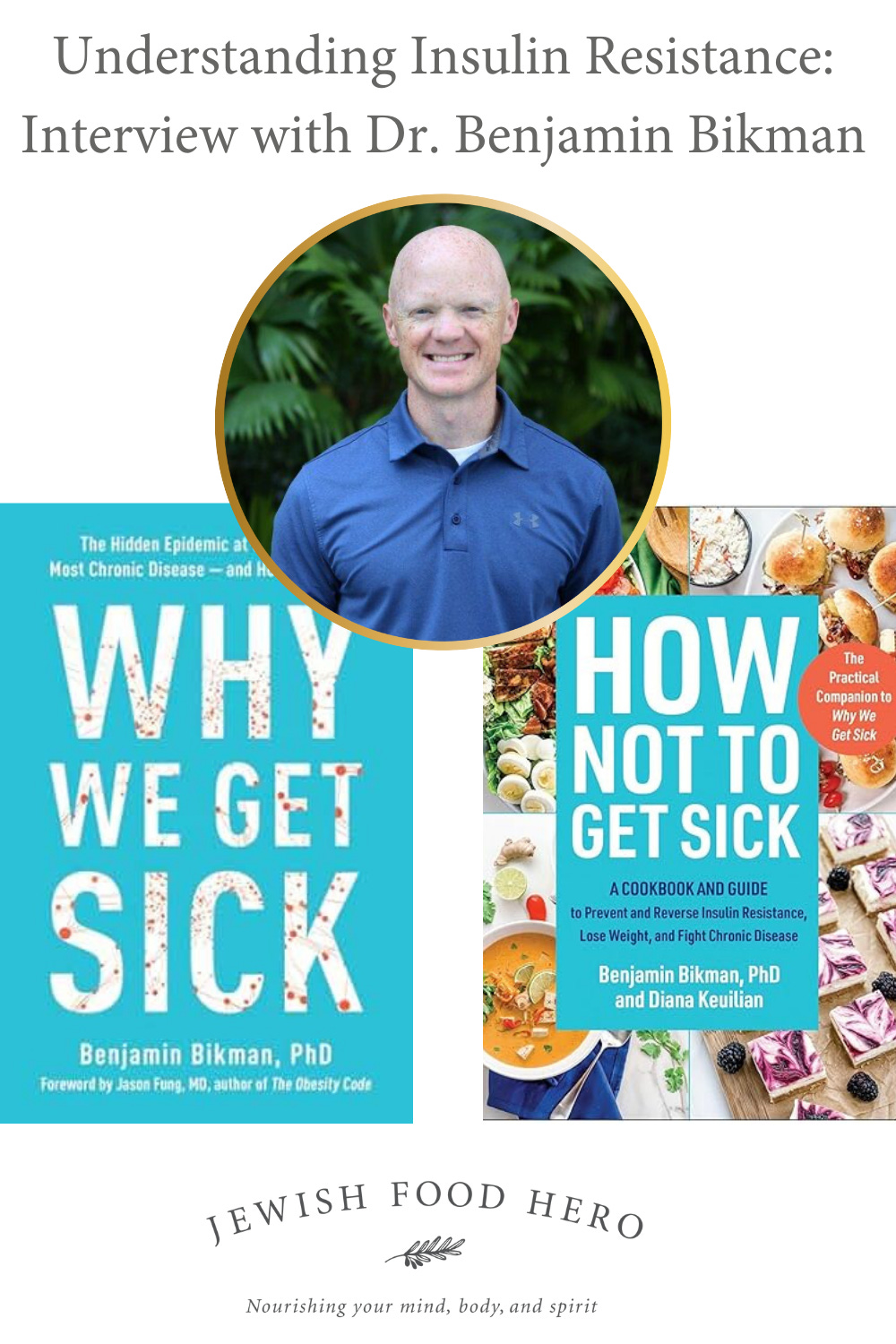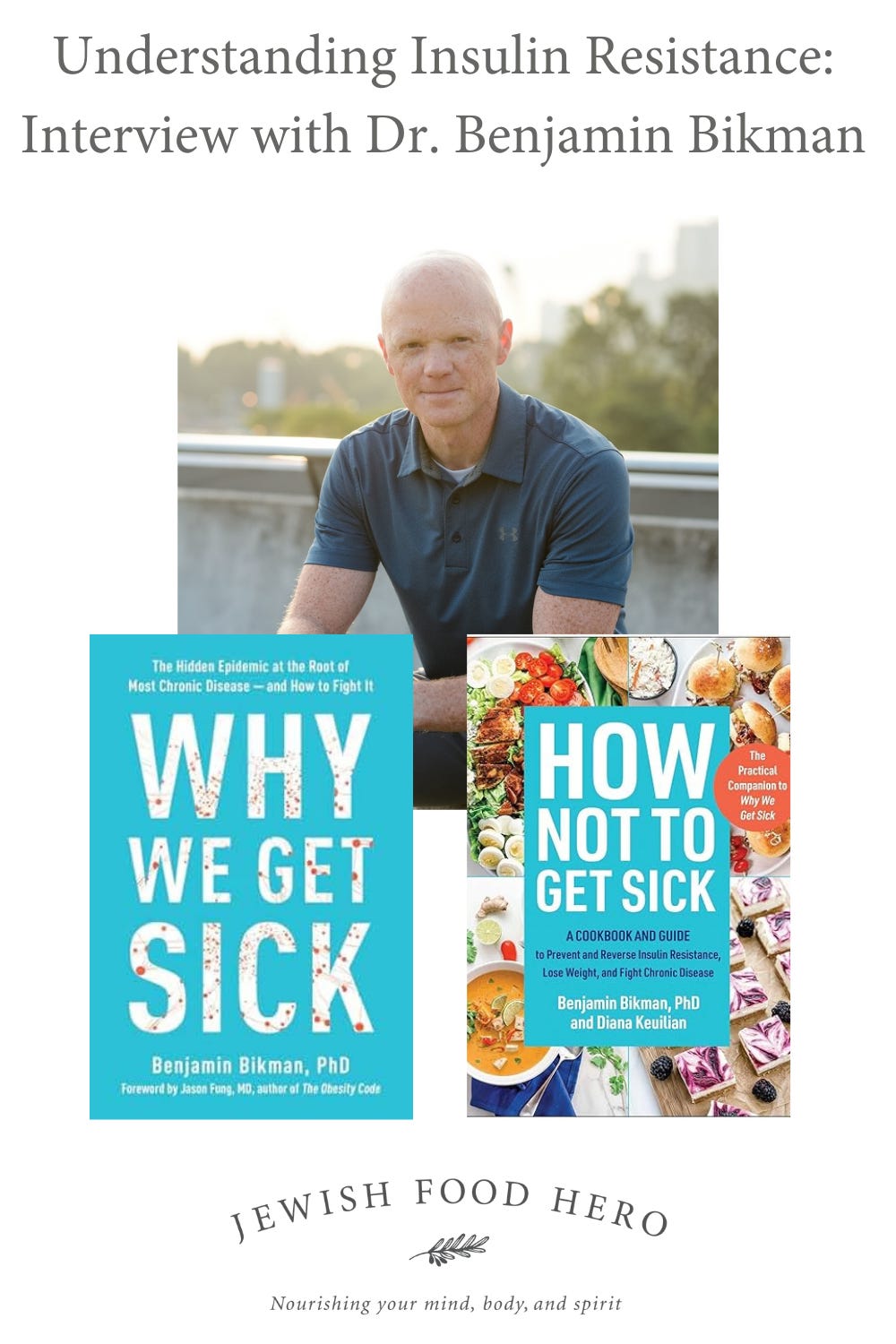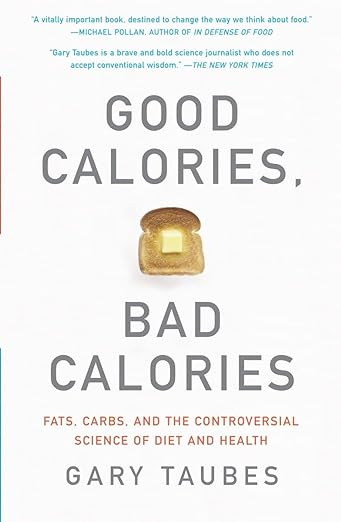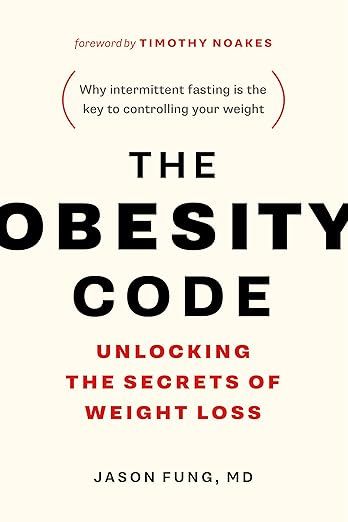Decoding Insulin Resistance: Interview with Dr. Benjamin Bikman
Key to Better Health
Dr. Benjamin Bikman is a renowned scientist and professor of Cell Biology at Brigham Young University. With a Ph.D. in Bioenergetics and a postdoctoral fellowship in metabolic disorders from Duke-National University of Singapore, Dr. Bikman’s research focuses on understanding the molecular mechanisms of metabolic diseases like obesity, type 2 diabetes, and dementia, emphasizing the role of insulin and ketones in metabolic function. His work seeks to uncover practical solutions for improving metabolic health and preventing chronic illness.
I first encountered Dr. Bikman’s work through his book Why We Get Sick and a podcast interview where he discussed the groundbreaking connections between insulin resistance and chronic disease. Inspired by his insights, I was motivated to reach out and interview Dr. Bikman, as his work aligns perfectly with my mission through Jewish Food Hero: to help the Jewish community embrace healthier living by providing clear, actionable information about nutrition and metabolic health. After all, as a Jew, nothing makes me feel more secure than a good conversation with a medical expert.
If you are interested in learning more about Dr. Bikman’s work, be sure to check out his two books:
Introduction
Please introduce yourself to our readers. We’d love to hear about your journey—what inspired your passion for metabolic health and research, and perhaps a bit about yourself as a person. What do you enjoy outside of your work, and what keeps you motivated in life?
I was born in a small farm town on the prairies of Southern Alberta, Canada, as the sixth of nine children. Despite the chaos of living in a home that never quite fit our family, my several siblings have become my best friends.
My academic journey began with a fascination for the body's adaptations to exercise, leading me to pursue an undergraduate degree in Exercise Science at Brigham Young University (BYU). I furthered my studies with a Ph.D. in Bioenergetics at East Carolina University, where my focus shifted from exercise adaptations to understanding the consequences of obesity. A postdoctoral fellowship at the Duke-National University of Singapore Medical School deepened my interest in metabolic disorders.
Currently, as a professor of cell biology at BYU, my research centers on the molecular mediators of obesity and its co-morbidities, with a particular emphasis on insulin resistance and mitochondrial function. I'm passionate about unraveling the intricate associations between metabolic and immune systems, aiming to contribute to the prevention and treatment of chronic diseases.
Outside of my professional endeavors, I cherish time with my family and maintain an active lifestyle. My personal interest in fitness complements my research, as I believe in practicing the principles of metabolic health that I advocate.
What keeps me motivated is the potential to make a meaningful impact on someone’s health. Witnessing individuals improve their well-being through informed lifestyle choices reinforces my commitment to research and education in metabolic health.
Understanding Insulin Resistance
Many people may be unfamiliar with the term "insulin resistance." Could you explain what it is?
Insulin resistance is a pathology with two parts. The first is the most obvious: when the body's cells don't respond properly to insulin. The second is less obvious—chronically elevated insulin levels. High insulin is both a cause of insulin resistance and a consequence of it. This creates a vicious cycle where high insulin levels (hyperinsulinemia) contribute to insulin resistance, and insulin resistance, in turn, drives higher insulin production. Over time, this disrupts blood sugar regulation and increases the risk of type 2 diabetes, obesity, and other chronic diseases.
Impact of Insulin Resistance on Health
Your work connects insulin resistance to numerous chronic illnesses, from diabetes to Alzheimer's. Can you elaborate on how insulin resistance contributes to such a wide array of health issues?
In the case of type 2 diabetes, it’s largely a result of resistance to the glucose-lowering effects of insulin. This leads to the chronic elevation of glucose levels, which defines type 2 diabetes. In Alzheimer’s disease, the condition is influenced by insulin resistance in the brain, which affects the brain’s ability to access glucose for fuel. With reduced fuel use, cognitive function declines as the brain essentially “starves.”
Metabolic Health and Daily Life
How can improving metabolic health impact daily energy levels, long-term brain health, and overall resilience in life?
“Metabolic health” is a vague term without a clear definition. To me, it’s best defined as “insulin sensitivity”—the degree to which the body effectively responds to insulin. This is the best indicator of metabolic health.
Living a life that keeps insulin under control is essential. When we eat a diet that chronically elevates insulin, the body becomes more insulin resistant, and the risk of chronic diseases increases. To address this, managing macronutrients is key:
Control carbohydrates – Avoid carbs that come in bags and boxes with barcodes. Focus instead on whole fruits and vegetables.
Prioritize protein – Intentionally consume natural proteins regularly.
Don’t fear fat – Natural proteins come with fat, and that’s how they should be eaten.
By eating protein and fat together, satiety improves, hunger decreases, and insulin levels remain stable, helping the body reset its sensitivity to insulin.
Ketones and Metabolic Function
Your research highlights the role of ketones in optimizing metabolic function. Could you explain what ketones are and their role in supporting overall metabolic health?
Ketones are a fuel made by the body when cells burn fat at high levels. This process can only occur when insulin levels are low, as insulin dictates which of the body’s primary fuels—glucose or fat—is used. When insulin is elevated, the body relies on glucose for fuel. When insulin is low, the body shifts to fat burning, and ketones are produced.
Ketones are not only an excellent fuel for the body, but they also function as signaling molecules that inhibit inflammation and promote cellular repair processes like autophagy. They are particularly beneficial for the brain, with research suggesting therapeutic roles for ketones in conditions like seizures, migraines, and Alzheimer’s disease.
Practical Steps to Improve Health
For someone who feels overwhelmed by the idea of overhauling their diet or lifestyle, what would you recommend as the first small steps toward better metabolic health?
Start small by focusing on two key meals: breakfast and dinner. By prioritizing foods that stabilize blood sugar and insulin levels at these times, you set the stage for better energy throughout the day and improved sleep at night.
Focus on prioritizing high quality natural protein, healthy fats and minimizing carbohydrates (especially ultraprocessed carbohydrates) at breakfast and dinner
By making these intentional choices, you can create a solid foundation for better metabolic health every day without feeling overwhelmed.
Looking Ahead
What are you most excited about in the future of metabolic health research? Are there any recent findings or projects you’re currently working on that you’d like to share?
I’m delighted to see a greater push for less-processed foods. Eating whole foods—including meat, eggs, dairy, vegetables, and fruits—is essential for good health. I’m also encouraged by the growing accessibility of health-monitoring devices like continuous glucose monitors, which empower individuals to track their metabolic health.
Learning
For those looking to deepen their understanding of nutrition and take steps to improve their health, which three books would you recommend as a starting point, and why?
I recommend my book Why We Get Sick for a deeper understanding of metabolic health and insulin resistance, followed by How Not to Get Sick for practical application. Additionally, Gary Taubes’ Good Calories, Bad Calories is an authoritative exploration of the history and science of diets in health.
Jason Fung’s The Obesity Code to help understand the the science of weight gain and insulin resistance.
Nina Teicholz’s The Big Fat Surprise is an excellent resources for anyone interested in understanding the importance of dietary fats in our diet.
Podcast Interview
Here is a podcast with Dr. Bikman / “Is Your Diet Killing You?” Dr. Benjamin Bikman discusses the epidemic of insulin resistance in America and its profound effects on health, the sugar addiction crisis, how dopamine hijacks your brain, how to navigate the American diet, and the potential to fix it invitationally
Dr. Bikman’s insights are clear and practical, emphasizing the pivotal role of insulin resistance in chronic diseases and the profound impact of dietary choices on overall health. By understanding the science behind metabolic function and adopting small, intentional habits—such as prioritizing unprocessed foods, protein, and healthy fats—we can empower ourselves to achieve better energy, brain health, and overall resilience. His work serves as a reminder that lasting health begins with informed choices, making metabolic well-being accessible and achievable for everyone. I hope you’ve gained valuable knowledge to implement in your life and your family’s life for improved health starting today.
To our health,
Kenden













